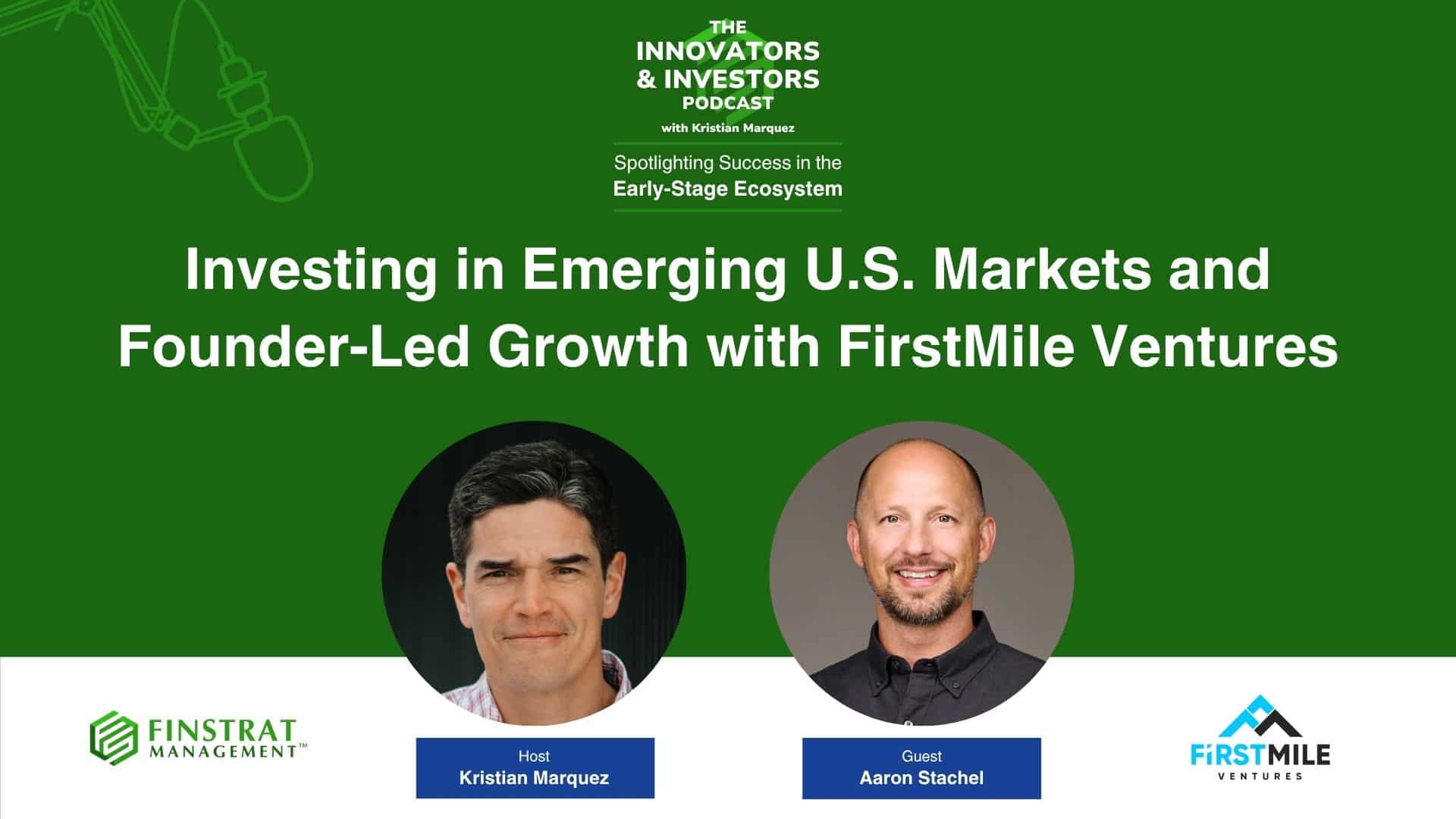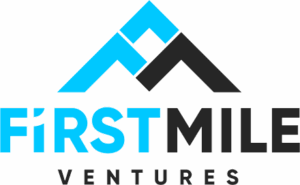Investing in Emerging U.S. Markets and Founder-Led Growth with FirstMile Ventures
June 26, 2025 | 39 MIN

Highlights
- FirstMile Ventures focuses on being the “first partner” for pre-seed and seed startups outside traditional tech hubs like Silicon Valley.
- Colorado and Texas are emerging as vibrant ecosystems attracting talent and companies migrating from expensive coastal cities.
- The firm maintains an industry-agnostic approach, backing diverse sectors to build a resilient and varied portfolio.
- Aaron Stachel’s unique background as a helicopter pilot and experience in M&A provide a distinctive lens on leadership and dealmaking.
- Founder-led sales are critical at early stages; the CEO’s involvement in sales offers invaluable market feedback before building a sales team.
- FirstMile is cautiously optimistic about AI, focusing on infrastructure and application layers rather than massive AI model development.
- The quality and communication skills of founding teams remain the most important investment factor at the pre-seed stage.
Summary
In this episode of The Innovators and Investors Podcast, host Kristian Marquez interviews Aaron Stachel, partner at FirstMile Ventures, a seed-stage venture capital firm focused primarily on startups in Colorado and Texas. Aaron shares insights into FirstMile’s investment thesis, emphasizing the importance of supporting local founders at the earliest stages—particularly the pre-seed and seed rounds—to help companies find product-market fit. The firm takes a geographic approach, believing that great companies can be built outside traditional coastal tech hubs such as Silicon Valley and New York.
Aaron outlines how FirstMile has witnessed a growing trend of companies and talent migrating from costly coastal cities to more affordable and business-friendly regions like Colorado and Texas, a movement accelerated by the pandemic but already in motion beforehand. Their investment approach is industry agnostic, supporting diverse sectors including cloud marketplaces, mental health, education technology, and consumer apps, reflecting the broad and resilient economic base of their regions.
Aaron’s personal journey into venture capital is notable—after a decade as an Army helicopter pilot, he pursued an MBA, gaining startup exposure and corporate M&A experience before co-founding FirstMile Ventures in 2014. This background shapes his strategic perspective, particularly when assessing startups and working with portfolio companies on critical early hires such as sales personnel. He stresses the importance of founder-led sales during the initial growth stages before scaling out the sales function.
The conversation also delves into the current AI investment landscape, where Aaron expresses caution about extremely capital-intensive AI “model companies” but enthusiasm for “picks and shovels” investments—companies providing infrastructure or application layers enabling AI adoption in enterprises. FirstMile favors under-the-radar opportunities driven by founders with deep domain expertise solving real problems often overlooked by larger venture players.
Aaron highlights the evolving venture capital environment, noting that advances in cloud infrastructure, APIs, and now AI empower capital-efficient startups capable of delivering traction with less funding than previous generations required. This aligns with FirstMile’s focus on early rounds and smaller check sizes to maximize return on investment. He emphasizes that great founding teams who can communicate compelling narratives and lead under uncertainty are the top criterion for investment at their stage.
The episode closes with reflections on lessons learned—particularly the recognition that leadership and communication skills often matter more than deep technical knowledge in early-stage investing—and a discussion about the transformative potential of AI across industries and venture practices. Aaron expresses interest in hearing about how other venture firms harness AI internally, suggesting this as a future podcast topic.
Key Insights
- Geographic Focus Unlocks Local Potential: FirstMile Ventures’ deliberate focus on Colorado and Texas challenges the traditional coastal bias in venture capital. By embedding themselves locally, they leverage regional advantages such as lower costs, a growing talent pool, and reduced competition for resources. This approach validates the idea that world-class startups can thrive anywhere, especially when supported by investors deeply familiar with those markets. It also aligns with broader trends of talent migration to more affordable and business-friendly regions accelerated by remote work.
- Pre-Seed as a Critical Investment Stage: FirstMile differentiates itself by targeting the earliest stages—pre-seed and seed—where the risk is highest but so are the potential rewards. This “first mile” investment philosophy focuses on helping founders find product-market fit, a notoriously difficult milestone. By concentrating resources and attention on this crucial phase, the firm can deploy capital more efficiently and support startups in ways larger funds may overlook. It highlights the strategic value in filling seed-stage gaps, particularly outside established ecosystems.
- Industry Agnosticism Fosters Portfolio Diversity and Resilience: Rather than specializing narrowly, FirstMile prefers a broad lens on sectors—from cloud marketplaces and health tech to consumer apps and education technology. This diversification strategy reduces systemic risk associated with any single industry downturn and reflects the heterogeneity of their local economies. It showcases an understanding that economic ecosystems with varied drivers tend to better withstand market cycles and attract a wider array of founding talent.
- Founders’ Leadership and Communication as Core Investment Criteria: Aaron stresses that at pre-seed stages—when revenue is minimal or nonexistent—the evaluation hinges on the founding team’s leadership ability, vision, and especially their skill in communicating the opportunity. His military and business background allows him to appreciate qualities like discipline, adaptability, and narrative storytelling, which are essential for raising capital, recruiting talent, and securing early customers. This insight reinforces the human-centered nature of early-stage venture investing beyond pure technical assessment.
- Delicate Transition in Early Sales Models: A key operational lesson from Aaron’s experience is the timing of establishing a sales function. Founder-led sales provide crucial real-time feedback on market demand, messaging, and customer pain points, enabling sharper product development. Prematurely offloading sales to external hires can obscure important signals and waste resources. The optimal moment to hire sales personnel occurs when the founder becomes the bottleneck to growth, ensuring the right balance between founder involvement and scalable sales execution.
- AI as an Evolution and an Opportunity, Not a Panacea: While AI’s hype is intense, Aaron’s perspective acknowledges that many AI startups are pursuing incremental improvements rather than disruptive new models. FirstMile prefers to invest in foundational “picks and shovels” technologies that enable enterprises to adopt and manage AI effectively. This reflects a pragmatic approach to AI investing, avoiding high-cost “model bets” that require massive capital and instead focusing on scalable infrastructure and applications that unlock broader market potential.
- AI’s Impact on Startup Capital Efficiency and Venture Dynamics: AI tools enable small teams to build prototypes and features faster, often with fewer resources, reducing capital needs at the earliest stages. This trend complements FirstMile’s thesis emphasizing capital-efficient founders. It may also lead to a shift in venture financing dynamics, where early-stage rounds could remain smaller but generate significant value, altering traditional fundraising and growth models. The insight emphasizes a future where AI democratizes entrepreneurship and could expand access within venture ecosystems.
Conclusion
This episode provides an illuminating and well-rounded look into how a regionally focused seed fund operates, including the nuances of founder evaluation, early sales strategy, and adapting to technological revolutions such as AI. Aaron Stachel’s experience provides valuable perspectives for founders, investors, and ecosystem builders alike, underscoring themes of locality, team quality, and thoughtful technology adoption. The discussion reinforces the vital role of early-stage capital in accelerating startups’ journeys while candidly acknowledging the evolving nature of venture capital in a fast-changing world.
Stay up-to-date with Aaron Stachel and his work at FirstMile Ventures.
Follow the show on your podcast channel of choice or listen below:




